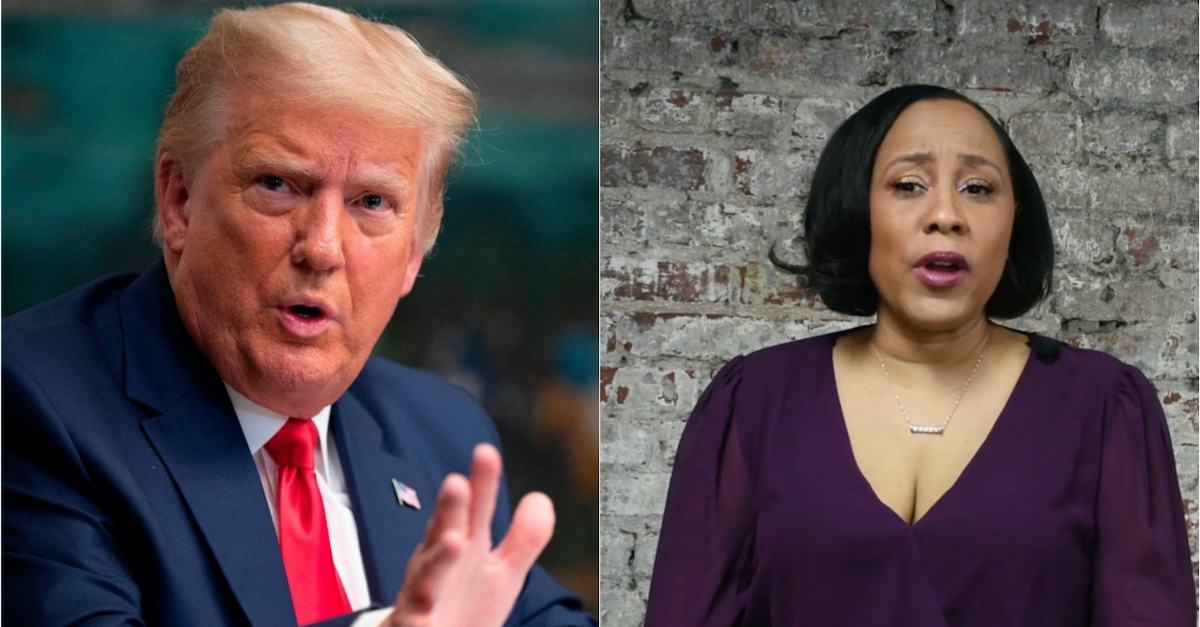
Donald Trump and Fulton County DA Fani Willis (Photo of Trump via Nicholas Kamm/AFP/Getty Images/ Photo of Willis via screenshot of video on DA’s website)
A Georgia judge ordered the partial release of a special grand jury report into former President Donald Trump’s efforts to overturn the results of the 2020 presidential election.
Those portions will be released on Thursday.
Fulton County District Attorney Fani Willis (D) had urged Superior Court Judge Robert McBurney to hold off on releasing the special grand jury’s report, telling him at a hearing last month that “decisions are imminent” as to whom to indict. She said that she needs to protect the due-process rights of the accused.
In an eight-page ruling, McBurney found some substance to that argument.
“This special purpose grand jury investigation was, appropriately, largely controlled by the District Attorney,” the judge noted. “She and her team decided who would be subpoenaed, when they would appear, what questions would be asked, and what aspects of the general election would be explored. The grand jurors were, of course, able to question the witnesses as well, but the process was essentially an investigative tool designed to enable the District Attorney to gather more information about what actually happened in the days following the general election in Fulton County (and elsewhere) so that she could make a more informed decision on whether Georgia law was violated and whether anyone should be charged for doing so. It was — again , entirely appropriately — a one-sided exploration.”
Though McBurney emphasized that this was not a criticism of the probe, he added that it affected whether the report could be released.
“That does not mean that the District Attorney’s investigative process was flawed or improper or in any way unconstitutional,” he said. “By all appearances, the special purpose grand jury did its work by the book.”
McBurney indicated that he does not intend to forever seal the portions of the report that will not be released later this week.
“The consequence of these due process deficiencies is not that the special purpose grand jury’s final report is forever suppressed or that its recommendations for or against indictment are in any way flawed or suspect,” the judge wrote. “Rather, the consequence is that those recommendations are for the District Attorney’s eyes only — for now.”
The logic of nondisclosure doesn’t hold in three portions of the report, the judge said.
“There are, however, three parts of the final report that are ripe for publication,” McBurney said.
Despite noting that “publication may not be convenient for the pacing of the District Attorney’s investigation,” the judge found that “the compelling public interest in these proceedings and the unquestionable value and importance of transparency require their release.”
“These three portions include the introduction and conclusion to the final report, as well as Section VIII, in which the special purpose grand jury discusses its concern that some witnesses may have lied under oath during their testimony to the grand jury,” the ruling states. “Because the grand jury does not identify those witnesses, that conclusion may be publicly disclosed at this time.”
By design, a special grand jury cannot issue indictments, but it can make recommendations that could be relevant to a separate grand jury. McBurney said that the special grand jury fulfilled that mission.
“Indeed, it provided the District Attorney with exactly what she requested: a roster of who should (or should not) be indicted, and for what, in relation to the conduct (and aftermath) of the 2020 general election in Georgia,” the ruling states.
After losing the 2020 election, Trump embarked on a quest to overturn the results in several states. In Georgia, Trump made an infamous phone call urging Georgia Secretary of State Brad Raffensperger (R) to “find 11,780 votes” — the precise margin needed to reverse President Joe Biden’s victory there — or potentially face criminal exposure.